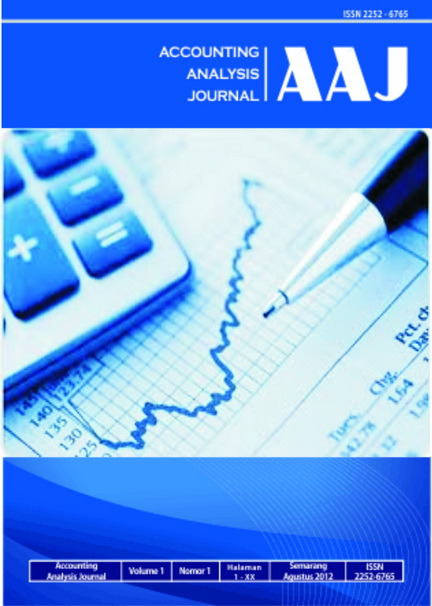The Analysis of Auditor’s Personal Charateristic Influence on The Acceptance of Audit Dysfunctional Behaviour
##plugins.themes.academic_pro.article.main##
Abstract
Penelitian ini bertujuan untuk menganalisis pengaruh karakteristik personal auditor terhadap perilaku disfungsional audit. Variabel independen yang digunakan dalam penelitian ini adalah locus of control eksternal, turnover intention, dan komitmen organisasi. Populasi dalam penelitian ini adalah 259 auditor yang bekerja pada Kantor Akuntan Publik di Kota Semarang. Pengambilan sampel dengan metode convinience sampling, dihasilkan sampel sebanyak 62 auditor. Pengujian penelitian ini dilakukan dengan teknik analisis regresi linear berganda dengan bantuan program IBM SPSS Statistics 21. Hasil penelitian ini menunjukkan bahwa locus of control eksternal dan turnover intention berpengrauh positif terhadap penerimaan perilaku disfungsional audit. Sedangkan komitmen organisasi berpengaruh negatif terhadap penerimaan perilaku disfungsional auditor. Saran bagi penelitian selanjutnya yaitu mengembangkan teknik pengumpulan data dengan metode wawancara langsung terhadap responden untuk mendapatkan jawaban yang lebih akurat.
The purpose of this study is to analyze the influence of auditor’s personal characteristics on dysfunctional audit behaviour. The independent variables of this research are of external locus of control, turnover intention, and organization commitment. The population of this research are 259 auditors working in the public accounting firm in Semarang. Data are selected by convenience sampling and obtains 62 auditors as the sample of the research. Multiple Linear Regression Analysis techniques is used to analyse data with the help of IBM SPSS Statistics 21 software. The finding shows that external locus of control and turnover intentions have positive and significant influence on dysfunctional audit behaviour. Meanwhile the organizaton commitment have negative and significant influence on dysfunctional audit behaviour. Further research is expected to develop methods of data collection techniques with direct interviews with respondents to get answer that is more accurate.
